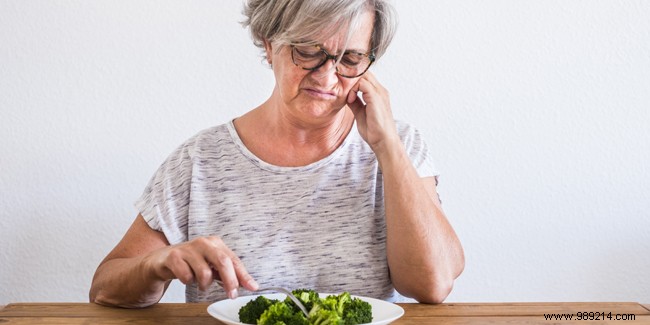
An older person can eat less. This loss of appetite can be caused by a pathology or have a psychological origin. In any case, it is important to take charge of the diet of the person concerned. We must identify the cause of eating disorders and try to restore his appetite. How ? Here are 6 tips and tricks to achieve this.
If an older person is not eating enough, it is important to identify the cause. She may be in pain:
This list is not complete. But the message is the following:if an elderly person eats less, it is necessary to identify the origin. Sometimes this involves a medical and dental check-up. Sometimes the cause is difficult to identify. It may be a refusal. This happens when an elderly person does not agree to comply with a specific regime or placement in a retirement home. It could also be simply age. Over time, the senses become fatigued and the metabolism slows down. Once you have identified the cause of the undernourishment, you must treat it and then restore the desire to eat!
An elderly person who does not eat enough is at risk of suffering from malnutrition. It will be more fragile! The undernutrition of seniors is recognizable. The signs are as follows:
Malnutrition can be caused by an unbalanced diet, insufficient intake or taking medication. Like the pathologies that cause a loss of appetite, malnutrition must be identified and treated.
It is quite possible that an elderly person does not like the food offered to him. If this is the case, it is necessary to take stock with her but also with the retirement home which welcomes her or the person or the service which manages the meals. A person who has cooked all his life may not appreciate the cuisine offered in collective structures at all. It is then necessary to find a compromise by offering more raw products and fewer over-cooked dishes. Sometimes all you need to do to give an old person an appetite is to ask them what they want to eat!
In case of oral pathology, it may be wise to offer pureed foods. Easier to chew, they are nutritious and tasty. Mixed dishes are a great alternative! It is possible to offer several perfectly adapted menus based on mashed vegetables, small pasta, rice, semolina… The Shepherd's pie is delicious, as is the brandade. Meats can be simmered longer. For fruits, it is enough to make compotes. Mousses are also very popular for dessert.
Often, community menus are low in fruits and vegetables. It can also happen that seniors do not take the time to go buy fresh produce or to cook it. To restore appetite to an elderly person, it is necessary to increase the quantity of fruits but especially of fresh vegetables. These are delicious, especially when they are in season. They must be cooked well so that they are easy to eat. In addition, fruits and vegetables are rich in fiber. They facilitate transit and ensure better well-being.
The routine does not please... When you get older, you mistakenly think that you have to cook a dish in quantity to be able to enjoy it for several days. This solution is good if you have the possibility of freezing the portions but if you eat the same several days in a row, you will no longer appreciate this dish! Varying menus and pleasures is essential to maintain the desire to eat.
To vary the menus of an elderly person, it is possible to order take-out meals, keep portions for them when you cook or ask to choose the menus from the retirement home or the meal delivery service.
It may happen that an elderly person follows a particular diet. In this case, it is possible that his food seems too bland. Sometimes you have to find more pleasant alternatives. This is the case in the context of a salt-free diet, for example. Dieticians can help you with your choices!
You also have to know how to separate things. At an advanced age, restrictions are good for health but not for morale. With the help of a doctor, it is a good idea to play fair and find out if the diet in place is really helping the elderly person.
There is no age to test new dishes or new cuisines. World cuisine is full of surprises! They can have different textures and flavors still unknown to the elderly. World cuisine is often offered to take away, so don't miss it.
It is important to maintain a balanced diet. As we have already said, fruits and vegetables provide fiber and are essential for maintaining a healthy digestive system. It is also necessary to ensure that an elderly person eats enough protein and calcium. The latter, with milk and dairy products, helps to fight against the risk of osteoporosis. Finally, hydration is important. The elderly can lose the feeling of thirst, the risk of dehydration exists!